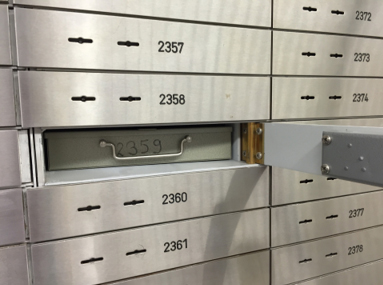It has been reported that 64% of people in America do not have a Will. If you have taken the steps to properly execute a Will then you should make sure after your death it can be easily found. If your Will is not found, it could be presumed that you had no Will or you revoked your Will. Here are a few options as to where to store a Will so your final requests can be followed:
- HOME SAFE

Some people store a Will in their home safe. Placing a Will in a waterproof and fire resistant safe in your home is better than keeping it stored with other papers in a file cabinet or on your desk.

Keep in mind that home safes are generally fire resistant for a limited number of hours. Buying a simple metal box and assuming that it will withstand a fire is an unwise decision.

If you go with the home safe option then you need to remember the combination and also give the combination to someone to access the contents.


If you have a bad memory or don’t have a trustworthy person to give the combination then the safe option may be a bad idea.
- ATTORNEY

Attorneys that help you draft a Will may store it for you. However, there is a risk that the Will may be misplaced when the attorney passes away, moves, or closes his or her practice. When you pass away, the estate representative would have to locate the attorney to obtain the Will.
- SAFETY DEPOSIT BOX

In Pennsylvania, the best place to store your Will is in a safety deposit box at a bank. The yearly cost for the box is in the range of $60. When you pass away, one of the first steps an estate representative or family member would take is to check your bank to see if there is a safety deposit box and then check the same for important documents, like your Will. The fact that you have a safety deposit box is clearly shown on your monthly bank statements.
In Pennsylvania, a safety deposit box may be entered after your death to remove a Will, so long as it is done in the presence of a bank employee. The bank employee must report the entry to the Pennsylvania Department of Revenue and certify that no other assets have been removed from the safety deposit box. A surviving spouse that has co-ownership of the safety deposit box may enter it without a bank employee present.
A safety deposit box is a good option for several reasons:
- The box provides security;
- It is protected from fire, flood and other natural disasters;
- Your Will is protected from being lost, misplaced or accidentally destroyed; and
- If you want your Will to be private until it is probated, the safety deposit box will provide privacy from anybody who would go through your belongings. Each bank has procedures in place to avoid improper access to a safety deposit box such as requiring signatures, identification, two keys to enter the box and bank employee to retrieve the box with you. The boxes are usually away from the bank entrance and in areas with alarms and video cameras.
If you, a family member or friend needs a Will contact Washington & Washington today and speak with an attorney for free to determine your estate planning needs.
